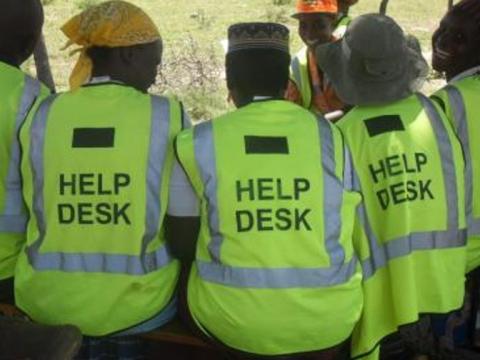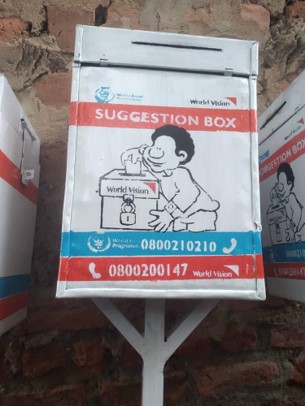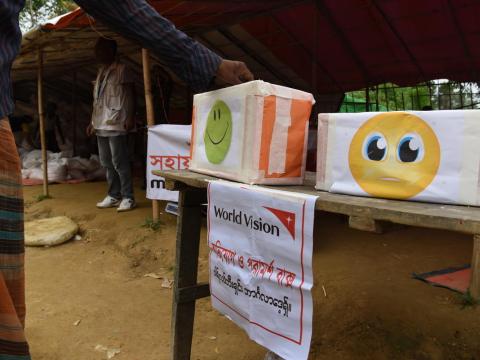
Is being Accountable enough?
By Catherine Green
Throughout the year, I look forward to the opportunity to train staff on Accountability in humanitarian contexts. I begin by introducing the origins of Accountability. At World Vision, 'Programme Accountability' is described as how we seek to be accountable to the children and communities that we serve. I explain that children and communities are often in a position of vulnerability, with their needs, rights, and ideas ignored by more powerful decision-makers, including NGOs like World Vision. In essence, Programme Accountability covers how World Vision uses power responsibly and creates mechanisms that empower children and communities to hold us to account. It's an extended definition and staff often stay silent, listening intently and taking notes.
Yet, when we explore some of the origins of these commitments to Accountability, such as the Joint Evaluation of emergency assistance to Rwanda conducted following the Rwandan Genocide in 1994 and resulting recommendations for increased Accountability, I start to see my students' expressions transform. I pause as I watch them go through the difficult thought process. The stark realisation that Accountability was born - not out of efforts to do no harm, but actually because we, as a humanitarian sector, inflicted a great deal of harm. This is a sobering reality for many staff and for those throughout the humanitarian world.
For me, it is just as important to look at the consequences of NOT 'doing' Accountability well, just as much as looking at the success stories where we improved programme quality. Just looking at the impact as a result of good Accountability practices paints only half a picture. We need to know where we have gone right – and wrong.
My first experience in the humanitarian sector was working in one of the first dedicated Humanitarian Accountability teams within World Vision as part of the Indian Ocean Tsunami Response in Sri Lanka. I knew this is where my passion would remain. I believe Accountability is right-based at its very core and prioritises the dignity, choice and opinion of communities affected by disaster – even if those opinions may not be what agencies and donors think is best and what "we have to offer". In 2004, during the Tsunami response, these 'Accountability teams' were a pilot for World Vision. More than 15 years on, Accountability is well and truly embedded within the way World Vision works across the partnership and within the humanitarian sector more broadly.
Our Program Accountability Framework guides how we implement Accountability in both humanitarian and development context; furthermore, we ensure that Accountability is cemented as a core function within our WV Disaster Management standards.
More globally, Accountability as a priority within the humanitarian sector continues to grow. Donors demand to know how we are Accountable to the people we serve; organisations continue to invest in improving Accountable practices; and this year, at the Humanitarian Networks and Partnerships Week (HNPW) co-shared by OCHA and the Swiss Agency for Development and Cooperation (SDC) - one of the largest humanitarian events of its kind has made Accountability to Affected Populations as one of the nine priority topics.
we serve; organisations continue to invest in improving Accountable practices; and this year, at the Humanitarian Networks and Partnerships Week (HNPW) co-shared by OCHA and the Swiss Agency for Development and Cooperation (SDC) - one of the largest humanitarian events of its kind has made Accountability to Affected Populations as one of the nine priority topics.
But is all of this really enough?
Even in the last 15 years, the humanitarian sector has changed significantly. We are working more through intermediaries and partners; the adoption of cash-based programming has ballooned; access to phones and the internet has increased; and we heralded in new commitments and targets in 2015 with the Grand Bargain, an agreement between some of the largest donors and aid providers, which aims to get more resources and power into the hands of people in need. I ask myself: Is now the time we to change the way we think about being Accountable to communities?
We have seen a flurry of activity focusing on adopting and scaling-up of digital Accountability solutions during COVID-10. But are these the solutions that people actually want, considering many communities tell us that they still prefer face-to-face communication with trusted staff and partners to give feedback.
At the response level, we continue to increase efforts to ensure that people have appropriate and effective communication channels to give feedback and be consulted. But we know that in many contexts, 'the information they provide seldom results in major changes.'
In emergencies, we agree that the need for vital information is just as critical as food, water, shelter and medical care. But as the most recent COVID-19 response showed us, people still do not have the crucial information they need - through the channels they need and trust - to make decisions about their own self-recovery.
These are not easy dilemmas within the accountability space for the humanitarian sector to deal with.
It can be argued that the humanitarian sector as a whole has come a long way in being 'accountable'. But this is not the time to sit back and rest easy. As the world and the contexts in which we work continue to change, we also need to constantly adapt how we ensure we are accountable to the communities that we serve. The stark realisation of the reason for Accountability – and transparency for us to reflect on our own mistakes - – needs to be in front and centre of our thoughts and efforts.
Catherine Green is Humanitarian Accountability Advisor for World Vision International.
